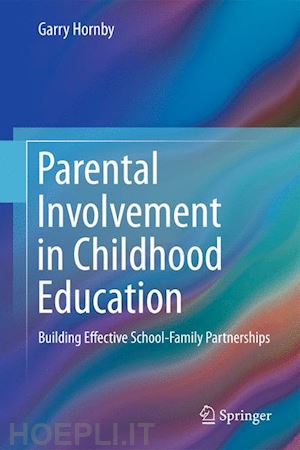

Questo prodotto usufruisce delle SPEDIZIONI GRATIS
selezionando l'opzione Corriere Veloce in fase di ordine.
Pagabile anche con Carta della cultura giovani e del merito, 18App Bonus Cultura e Carta del Docente
Parental participation has long been recognized as a positive factor in children’s education. Research consistently shows that parents’ contributions to their children’s education lead to improvements in their academic and behavioral outcomes, from elementary through middle and secondary school. Recognizing the critical role of school psychologists in this equation, Parental Involvement in Childhood Education clearly sets out an evidence-based rationale and blueprint for building parental involvement and faculty awareness.
The author’s starting point is the gap between the ideals found in the literature and the reality of parental involvement in schools. An ecological analysis identifies professional, institutional, and societal factors that keep schools and parents distant. Methods for evaluating parental involvement are detailed, as is a model for developing and maintaining strong parental relationships at the instructor, school, and education system level, with an emphasis on flexible communication and greater understanding of parents’ needs. This empirically sound coverage offers readers:
Parental Involvement in Childhood Education is essential reading for practitioners and researchers in school psychology and counseling, social work, and educational psychology, whether they work directly with schools or in providing training forteachers and other professionals who work with children and their parents.
Garry Hornby (BSc, BA, MA, Dip.Ed.Psych. Ph.D, CPsychol., FBPsS) is a professor of educational psychology in the College of Education at the University of Canterbury in Christchurch, New Zealand. He is a chartered educational and counselling psychologist, and fellow of the British Psychological Society.
Professor Hornby was born in England and completed a degree in physics at the University of Leeds. His first job was as a counselor in a residential school for emotionally disturbed children in the USA. He then worked as a secondary school teacher in England and New Zealand. From there he went on teach a special class for children with moderate learning disabilities and subsequently trained and worked as an educational psychologist in Auckland. He worked as a teacher educator at the Auckland College of Education before returning to England to work as a lecturer and researcher at the Universities of Manchester and Hull for fifteen years. He lectured for two years at the University of the West Indies in Barbados before moving to Christchurch, New Zealand, where he has been for eight years. He is married to a Barbadian and has two secondary school age sons.
His teaching and research is in the areas of educational psychology, special education, counselling, teacher education and parental involvement in education. His previous publications include: Counselling in Child Disability (Chapman and Hall, 1994); Improving Parental Involvement (Cassell, 2000); Mental Health Handbook for Schools (Routledge. 2002); Counselling Pupils in Schools: Skills and Strategies for Teachers (Routledge, 2003); Meeting Special Needs in Mainstream Schools (2nd ed.) (David Fulton, 2000).











Il sito utilizza cookie ed altri strumenti di tracciamento che raccolgono informazioni dal dispositivo dell’utente. Oltre ai cookie tecnici ed analitici aggregati, strettamente necessari per il funzionamento di questo sito web, previo consenso dell’utente possono essere installati cookie di profilazione e marketing e cookie dei social media. Cliccando su “Accetto tutti i cookie” saranno attivate tutte le categorie di cookie. Per accettare solo deterninate categorie di cookie, cliccare invece su “Impostazioni cookie”. Chiudendo il banner o continuando a navigare saranno installati solo cookie tecnici. Per maggiori dettagli, consultare la Cookie Policy.